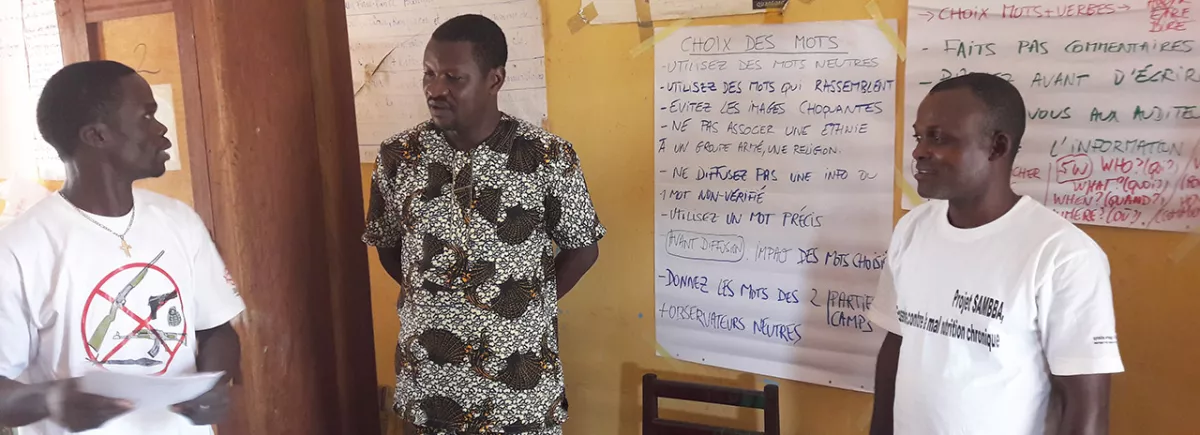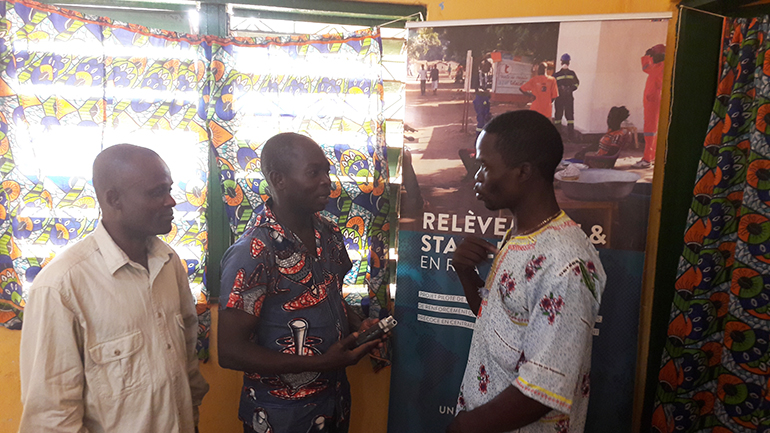
A sensitive journalistic approach to conflict in the Central African Republic
Related project
Recovery and stabilization in Central African Republic, mediasSixteen professional journalists from radio stations mentored under the Relèvement et Stabilisation [Recovery & Stabilisation] project met up in Berberati from 14 to 28 February 2019 to hone their technique for reporting in periods of conflict.
This was seen as an essential initiative in terms of the CAR media, which are evolving in a climate of crisis and conflict that has existed over a period of many years.
Providing the population at large with information in a professional and non-partisan manner, understanding the conflict in all its aspects, comprehending the levels of risk in a context in which work resources are in short supply...: this is what it means to work and to operate as a journalist amidst the conflict in CAR, where gaining access to information and news continues to be a major challenge, and it requires a particular approach and level of understanding on the part of the media.
The radio stations mentored under the Relèvement et Stabilisation project met this challenge by attending a two-week training course devoted entirely to addressing the problems faced by journalism in a period of conflict. The course was led by Emmanuel de Solere Stintzy and Arsène Mosseavo, themselves both journalists.
The first two days of the course were aimed at providing background information and brought together journalists, sociologists, civil society organisations and former members of armed groups with a view to defining the broader notion of
conflict and establishing a common code of engagement that would facilitate the work of community radio station journalists in sensitive zones.
After these two inaugural days, attendees moved on to the Radio Zoukpana premises to continue the course. Here, the emphasis was placed on journalistic practice in a period of conflict: the joint establishment of a lexicon of terms of incitement to hatred; sessions on writing for radio, interviewing techniques and choice of words; how to select sources; and a consideration of the risks of manipulation and abuse, of codes of ethics, and of preparation measures and alert systems in sensitive periods.

The journalists then set off in pairs into the field to compile reports, implement microprogrammes, and draft portraits - this work was for a jointly produced themed broadcast on: Rumours and messages of hate:
the role and responsibilities of community radio stations.
"This course is crucial to my work. I'm from Carnot, a powder-keg in terms of security and always prey to conflict between stockbreeders and arable farmers... other tensions are ever-present, too, such as disputes over land ownership, for example. The course has made me better able to deliver news and information in a more professional manner and will, in the longer term, help to relieve tensions within my community."
Evariste Nolas, Radio Zoukpana
The
Relèvement et Stabilisation project is the initiative of Expertise France in CAR and is funded by Fonds Bêkou. CFI is managing media aspects of the project in collaboration with the ARC [Central African Republic Community Radios Association].


